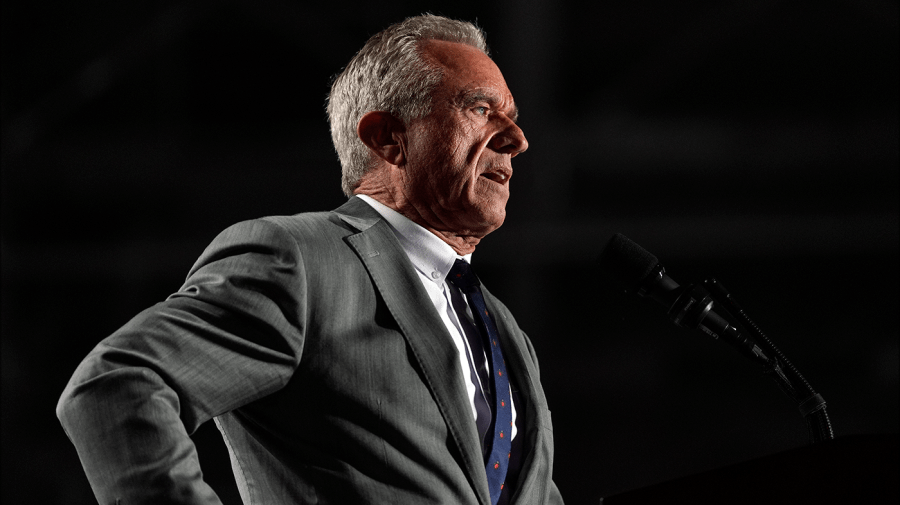
Amid President-elect Donald Trump’s scramble to fill the incoming administration, his nomination of Robert F. Kennedy Jr. to lead the Department of Health and Human Services (HHS) may wind up being the most consequential.
While the choices to lead the Pentagon or State Department have a higher profile, as the head of HHS, Kennedy would have tremendous power over issues that impact the health and safety of all Americans.
To that end, America’s public health finds itself facing an unprecedented set of challenges.
On one hand, Kennedy’s well-known skepticism toward vaccines threatens to undermine what has been one of the greatest scientific achievements of the past century: the eradication of many diseases and illnesses through required vaccination programs.
Conversely, his push to address the obesity epidemic through eliminating harmful food additives and limiting dangerous fats and oils have the potential to help millions of Americans.
Balancing these two competing approaches to public health will be an immense challenge, both for everyday Americans and for the scientific and medical community, which should applaud efforts to combat obesity while outright rejecting Kennedy’s overtly anti-vaccine stance.
Indeed, according to the Centers for Disease Control and Prevention, over the last three decades, vaccines have “prevented approximately 508 million cases of illness, 32 million hospitalizations, and over one million deaths.” That data flies in the face of Kennedy’s claim that “there is no vaccine that is safe and effective,” and threatens to severely undermine the absolutely positive public good that vaccines continue to do.
In that same vein, while the COVID-19 pandemic did impact the public’s attitude toward vaccines — a problem exacerbated by exaggerated claims of vaccine effectiveness — Kennedy’s anti-vaccine position threats the uptake of certain vaccines with decades of proven safety and effectiveness.
Consider polio, the measles or even smallpox, each responsible for crises of their own but now virtually eradicated in the United States due to policies which mandate vaccinations. In fact, an analysis from the New York Times noted six former epidemics that previously devastated the U.S. as late as the 1960s which have been eradicated due to vaccination campaigns.
The vaccines for these viruses (and many others) have long track records demonstrating their safety, yet Kennedy’s blanket skepticism threatens to convince many Americans that they’re better off not vaccinating themselves or their children. And Aaron Siri, the lawyer advising Kennedy on hiring choices for the HHS, has filed lawsuits seeking to revoke the approval of 14 vaccines, including those for polio.
In no uncertain terms, this approach is extremely dangerous and could even lead to the next epidemic.
Of course, this is not to say that Americans should have no individual freedom to make choices surrounding their health. However, it is to make absolutely clear that vaccinations are a matter of the health and safety of all Americans — and in some cases, the public good must come first. It is incumbent on the Trump administration to recognize this.
Similarly, the Trump administration generally, and RFK Jr. specifically, should understand that American drug companies play a vital role in improving Americans’ health, and should be supported, not demonized. And as the COVID-19 pandemic made clear, it is a matter of national security that we have robust and innovative pharmaceutical and medical companies.
The tragic killing of UnitedHealthcare CEO Brian Thompson has reignited the debate over the costs for drug and medical procedures in the United States. Working to lower the costs is a wholly justifiable pursuit, and something Trump and Kennedy should absolutely prioritize.
But it would be a mistake to approach this issue by crippling American pharmaceutical companies. Our country must remain a leader in medical R&D, and the only way to do that is to incentivize companies to continue developing new treatments and cures.
To be clear, despite the dangers mentioned above, I do believe there are aspects of Kennedy’s “Make America Healthy Again” movement that would contribute positively to Americans’ health.
At a time when roughly 4 in 10 Americans (43 percent) are considered obese, according to the World Health Organization, it is clear that something must be done to combat this growing epidemic. Kennedy’s push to overhaul what Americans eat should be applauded, although not at the expense of prohibiting medicines such as Ozempic, Zepbound and others.
Here again, the challenge of balancing the good and bad in Kennedy’s approach is apparent. He has long promoted personal responsibility and lifestyle changes to address issues such as obesity and even addiction while criticizing modern medicine’s achievements. However, it should be pointed out that abstinence, personal responsibility and even diet or exercise modifications simply are not enough for everyone, and that if there are medicines that safely address obesity or addiction, that should be applauded by our health officials.
Ultimately, it is my sincere hope that, if confirmed by the Senate, Robert F. Kennedy Jr. and the officials he brings into HHS will recognize the public good and necessity of continuing vaccination requirements — at least for those which have long track records demonstrating safety and efficacy. Failure to do so, whether by revoking FDA approvals or repealing requirements, presents significant risks to the health of more than 330 million Americans.
At the same time, Americans, particularly the scientific community, must find a way to balance the aspects of Kennedy’s policies that are dangerous with those that may actually benefit the country.
Pollster Douglas E. Schoen is a partner with the public opinion company Schoen Cooperman Research based in New York and co-author of the book, “America: Unite or Die.”

